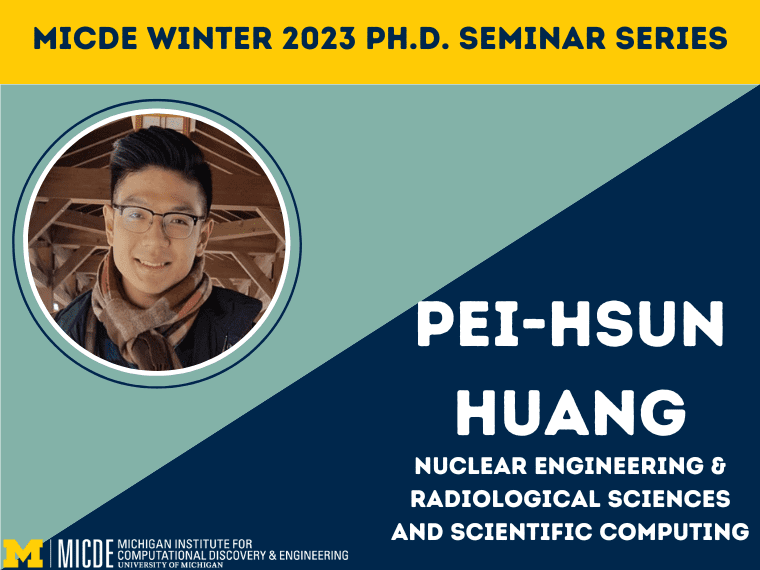Events

- This event has passed.
PhD Seminar: Pei-Hsun Huang
February 23, 2023 @ 4:00 pm - 4:30 pm
Venue: Rackham Building, Earl Lewis Room, 3rd Floor East

The Ph.D. in Scientific Computing program is intended for students who will make extensive use of large-scale computation, computational methods, or algorithms for advanced computer architectures in their doctoral studies. This seminar series showcases the breadth of research covered by the program.
Featured Speaker:
Pei-Hsun Huang, PhD Candidate, Nuclear Engineering & Radiological Sciences and Scientific Computing
Pei-Hsun is a PhD student in Nuclear Engineering & Radiological Sciences working with Professor Annalisa Manera in the Experimental and Computational Multiphase Flow Laboratory. His project involves high-temperature two-phase heat pipe technologies.
Simulation for the Design of Sodium Heat Pipes Bundle Test Facility for the Application of Microreactors
The 20 MW Special Purpose Reactor (SPR) is a heat pipe cooled microreactor that designed for electricity production in remote locations where reliable power grids are not always available. The key to SPR is the alkali metal heat pipes, which offer entirely passive operation capacity with high mobility. Prior to deployment, safety analysis with postulated accident scenarios is required for the licensing of SPR. To this regard, a sufficiently accurate model is crucial to predict the behavior of heat pipes, and high-resolution data is needed for the safety analysis of SPR. However, the current existing heat pipe models are either oversimplified or unpractical expensive in view of the difficulty of the simulation with the wick structure and two-phase flow in the heat pipe. Therefore, high fidelity experimental data is required for model verification in the high temperature heat pipe bundle system. The Michigan Sodium Heat Pipe bundle test facility which serves as a scale-down test facility using ten sodium heat pipes with a triangular array, was utilized to verify the model for the licensing of SPR. In the talk, the feasibility analysis using Computer Aided Engineering and Computational Fluid Dynamics for the design of the test facility was addressed.
This event is part of MICDE’s seminar series featuring Ph.D. students in the Scientific Computing program. This series is open to all. University of Michigan faculty and students interested in computational and data sciences are encouraged to attend.
Questions? Email MICDE-events@umich.edu